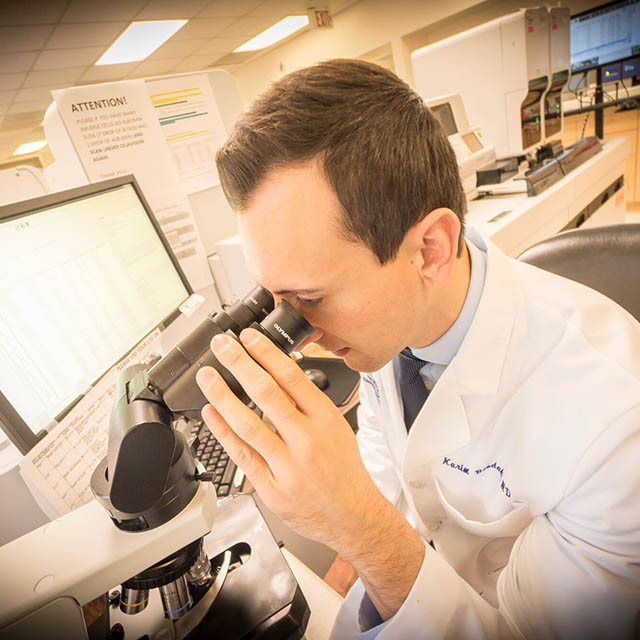Residents of the Washington, D.C., region can experience world-class Johns Hopkins cancer care, close to home.
Ashwani Rajput is working to make it even better.
The cancer surgeon and researcher joined Johns Hopkins in November 2019 as director of the Johns Hopkins Kimmel Cancer Center in the D.C. Region. Since then, despite the challenges of the coronavirus pandemic, he has hired two medical oncologists, formed a teaching partnership with the National Institutes of Health (NIH) and increased outreach to underserved neighborhoods in Washington, D.C.
Some 3,000 people each year receive treatment at the Johns Hopkins Kimmel Cancer Center in the D.C. Region for breast, bladder, colorectal, liver, lung and pancreas cancer, and for leukemia and lymphoma. Patients at Suburban Hospital, Sibley Memorial Hospital and outpatient clinics benefit from integrated care delivered by multidisciplinary teams that include surgeons, medical oncologists, radiation oncologists, physicists, nurses, imaging specialists and nutritionists.
With the Johns Hopkins Proton Therapy Center that opened at Sibley Memorial Hospital in October 2019, cancer patients now have the option of receiving radiation in the form of highly targeted proton treatment that destroys tumors while sparing nearby healthy tissue. The proton center is also the site for clinical trials, including one that uses advanced imaging for brachytherapy, the insertion of radioactive seeds that target gynecological cancer cells.
There are also 14 new high-tech surgical suites and recovery rooms at Suburban Hospital, part of the 300,000-square-foot North Building that opened in March. The operating rooms are designed to accommodate innovations in surgical imaging and robotic procedures.
“Where you get treated matters,” says Rajput, whose research focuses on the mechanisms that cause cancers to metastasize.
He notes that the Johns Hopkins University School of Medicine ranked first in the 2020 U.S. News & World Report lists in radiology, anesthesiology, surgery and internal medicine.
“Any cancer patient needs all those services,” he says. “The faculty in those No. 1 departments are here to take care of you in the National Capital Region. And if we think a patient would benefit from a clinical trial in Baltimore, it’s as easy as picking up the phone to get that person to the right place.”
Rajput says the three prongs of the Johns Hopkins mission — clinical care, research and education — work together to help patients. For example, he says, Johns Hopkins faculty members participate in national guidelines panels that set standards for cancer care.
He established a program with NIH that will bring third-year fellows to Sibley. The collaboration will train the next generation of surgical and medical oncologists while giving Johns Hopkins patients access to more clinical trials.
“The expectation is that they’ll rotate with the physicians and have their own set of patients,” says Benjamin Levy, the clinical director for medical oncology at the Kimmel Cancer Center at Sibley Memorial Hospital.
Rajput is also working to improve cancer prevention, diagnosis and care in Washington neighborhoods. “The coronavirus pandemic has highlighted how our Black and brown people are disproportionately harmed,” he says. “Cancer has the same disparities.”
He formed an advisory group with local activists and other representatives from all eight wards in the District. The goal, he says, is to begin meeting in the fall to assess how best to meet community needs.
Before coming to Johns Hopkins, Rajput worked at the University of New Mexico Comprehensive Cancer Center for more than 10 years, most recently as division chief of Surgical Oncology and chief of surgical services. As the department’s vice chairperson for academic affairs and faculty development, he collaborated with colleagues to study why some populations are more likely than others to get cancer and suffer worse outcomes.
Rajput graduated from and received general surgery training at Case Western Reserve University School of Medicine in Cleveland, and completed a fellowship in surgical oncology at Roswell Park Comprehensive Cancer Center in Buffalo, New York.
He came to Johns Hopkins, he says, to be part of a high-caliber organization delivering multidisciplinary, integrated care for the people of the nation’s capital.
“We are here for patients with rare, advanced cancers, as well as for people with more common cancers,” says Rajput. “We’re bringing Hopkins-level care to your neighborhood.”


